Q&A: Regis Prograis on his journey, learning boxing history and Josh Taylor
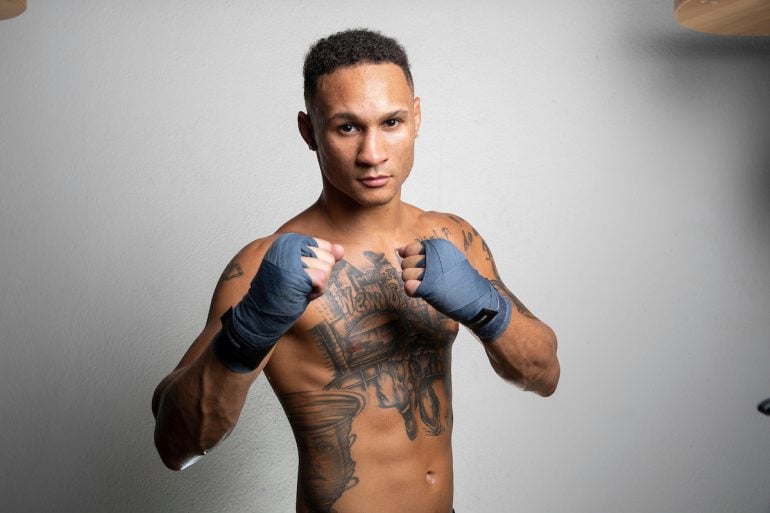
I think it was during Regis Prograis’ two-round destruction of Julius Indongo in early 2018 when it occurred to me that the junior welterweight standout’s style reminded me of old-time fighters.
There was nothing slick or impressively athletic about the manner in which the latecomer from New Orleans walked down and beat up the rangy southpaw, but he was as effective as he was punishing, catching punches on his forearms as he casually maneuvered in range to attack the Namibian’s body and head with well-timed bombs.
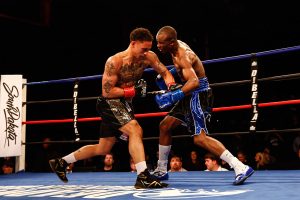
Prograis (left) nails Julius Indongo. Photo by Stephanie Trapp)
Prograis’ body language reminded me of old film and photos I’ve seen of Henry Armstrong and Archie Moore. So you can imagine my delight when I learned that he’s just as into those two all-time greats (and other legendary fighters from past eras) as I am when I sat down with him during the first phase of his training camp for Josh Taylor, which took place in Santa Monica, California.
Prograis-Taylor is a dream fight for hardcore fans. The World Boxing Super Series final matches two unbeaten 140-pound world titleholders for the coveted Muhammad Ali trophy and the vacant Ring Magazine junior welterweight championship this Saturday in London at the O2 Arena. The fight will be broadcast live on DAZN in the U.S.
It was refreshing to hear that Prograis is every bit as excited about the showdown as the diehards, especially following his management/promotion’s August announcement that he would be withdrawing from the tournament due to financial squabbles.
However, cooler heads prevailed and one of the best (50-50) matchups of 2019 was salvaged. Prograis never took his eyes off the prize. The 30-year-old southpaw views the Taylor fight as destiny, and when talking to him about the magnitude of the fight and the breakdown of the matchup, it’s very hard to count him out.
In his mind, this is the culmination of a 14-year journey that began with Hurricane Katrina devastating his home city, displacing him to Houston where he found the Savannah Boxing Gym and began his current path in earnest.
Prograis (24-0, 20 KOs) recently moved to Santa Monica, but his heart remains in Houston, where he spent three weeks of this camp before finishing up in London.
“We usually do a two-part camp, we start here (Santa Monica) and then finish up in Houston, where it started for me,” Prograis said. “But this time, it’s a three-part camp, here, Houston and then we finish up in London for three weeks.
“I had to return to Houston for the weather. It’s just so humid out there. You can’t mimic that in the gym nowhere else. You start sweatin’ while you wrappin’ your hands. It might be 96 degrees outside, but it will be 110 in the gym. And we workin’ out in that.”
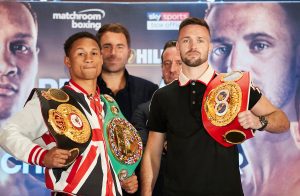
Taylor (right) and Prograis are both armed with 140-pound world titles. Photo by Mark Robinson
On Saturday, Prograis will be hell bent on bringing that kind of heat to Taylor (15-0, 12 KOs), a tall, rangy fellow southpaw from Scotland, who is just as confident as he is. Prograis relishes the challenge, which is no surprise given his background and personality, which I hope this Q&A does justice to.
We talked about his New Orleans roots, his entrée into boxing, his passion for the sport’s history (sparked by his admiration of Mike Tyson), and of course, his thoughts on Taylor.
Doug Fischer: You’re from Louisiana but you started boxing in Houston, so do you consider yourself a Houston fighter or Texas fighter?
Regis Prograis: I don’t know if I can say that (laughing) because my New Orleans people will get mad at me. My heart and all that stuff, it’s always going to belong to New Orleans, but if it wasn’t for Hurricane Katrina and Houston, I wouldn’t be where I’m at right now.
Fischer: You wouldn’t have found boxing if you hadn’t moved to Houston?
Prograis: I would have found boxing, because, to be honest, Hurricane Katrina hit in August, right? I started boxing when I was 16, when I was in the 10th grade. I went to a gym (in New Orleans) for a few weeks but my grades were falling (at the time) so my momma took me out and told me “You’re gonna have to wait until summer time (to resume training).” As soon as school ended in May, I found another boxing gym and from May until August I was just training. It was like love at first sight, basically. I was training every single day. Usually, in the summer, I was just playing with my partners in the street, but I was so serious about boxing and I loved it so much that I was in the gym until Katrina hit.
Then I had a long break, I had to move around a lot. I went to Houston first, then Mississippi, then Slidell (Louisiana), and then we came back to Houston. And when he got back to Houston, that’s when I went to (Willie) Savannah’s gym.
Fischer: You were already thinking about boxing before relocating to Texas.
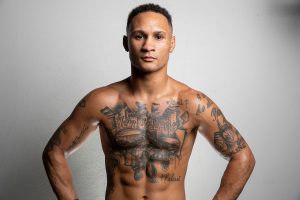
Regis Prograis photo by Ian Walton
Prograis: I already kind of knew what I wanted. Luckily, I knew this was what I wanted to do when I was 16, and then Houston put steroids on it because when I first started at Savannah’s boxing gym, (Evander) Holyfield was there, Juan Diaz was a three-time world champion, he was there, Rocky Juarez and Raul Marquez were there, me and the Charlo twins, we grew up together, Hyland Williams, Omar Henry, Vanes Martirosyan, Erislandy Lara, Guillermo Rigondeaux and… that’s 10 people I just named, no, with the twins that’s 11! So, I was around that when I was a kid. And there was a voice in me that said, “You can do all this, too.”
The twins, they were like top amateurs, but I was just starting, and I had to spar with them. We kind of all grew up together. Being in that environment and seeing that as a child, it was inspirational. Mike Tyson was my favorite fighter and literally, right next to me, hitting a heavy bag was Holyfield. Now, he was at the end of his career, but still, it’s Holyfield! Great fighters were around me.
Fischer: And great trainers. Ronnie Shields was training most of those guys. He trained Tyson for a fight or two near the end.
Prograis: Exactly. Ronnie trained great fighters, Pernell (Whitaker), Holyfield, everybody. And, you know, great fighters from out of town would visit and work out. We got Shane (Mosley) from time to time. (Oscar) De La Hoya would come to the gym. That made me realize I could do it too.
Fischer: You were always motivated to be a professional boxer. You always had aspirations to be a world champion, and now you’re so close to becoming a unified, Ring Magazine champion, but for a spell there it looked like this World Boxing Super Series final wouldn’t happen. It was announced that you were out of the tournament.
Prograis: For me, I was never out of it. There were just some things in my contract that needed to be tightened up. I think my management just said all that stuff with the press release to light a fire under them. But for me it was never about IF I was going to fight Taylor, it was WHEN I was going to fight him.
Fischer: So, you never thought there was a chance that you’d be out of the tournament and wouldn’t immediately face Taylor? You never once refocused your attention to another fighter? You never set a new goal? You seem very goal oriented.
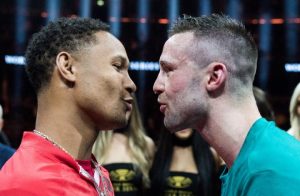 Prograis: No, I never lost my focus on Taylor. For me, he’s the fighter that makes the most sense for my career right now. You got No. 1 and No. 2 fighting each other, both undefeated, both world champions and in their prime. And then you got all this stuff on the line, two world titles, The Ring Magazine championship belt, the Muhammad Ali trophy. And then it’s in London at the O2 Arena? Come on, this is a dream-come-true type of fight. So, there was no way I wasn’t going to fight him. I knew I was going to fight him.
Prograis: No, I never lost my focus on Taylor. For me, he’s the fighter that makes the most sense for my career right now. You got No. 1 and No. 2 fighting each other, both undefeated, both world champions and in their prime. And then you got all this stuff on the line, two world titles, The Ring Magazine championship belt, the Muhammad Ali trophy. And then it’s in London at the O2 Arena? Come on, this is a dream-come-true type of fight. So, there was no way I wasn’t going to fight him. I knew I was going to fight him.
And if you look at the history of the World Boxing Super Series, yeah, there were some fighters who complained about different things, some people threatened to pull out, but the fights always went through. The finals always happened.
Fischer: Right, Ivan Baranchyk was ready to leave…
Prograis: But it all went through, Branchyk fought. If you look at the history, there were delays, but nobody pulled out, everybody fought. So, I knew I was going to fight.
Fischer: OK, talk to me about Taylor. What’s your scouting report on the IBF titleholder? What makes him successful? What do you see that you can exploit once you’re in the ring with him?
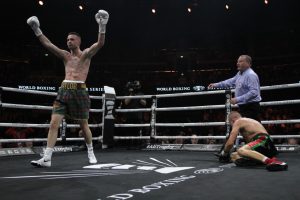
Taylor drops Baranchyk during their title bout. Photo by Shabba Shafiq/ SW33TSCIENCE Photography
Prograis: Well, first thing I’ll say is that I think he’s the best 140 pounder in the world, behind myself. I rate him just like everybody else rates him. Of course, some people (ESPN.com) have (Jose) Ramirez rated No. 1 with me No. 2 and Taylor No. 3, but I just don’t think that. Most see me and Josh as one and two. But I think he’s a real good fighter. I just can’t see how he can beat me, basically because he does get hit with a lot of shots and I can do so many different things. The main thing is, I got 24 fights and most of those 24 fights look different. He got 15 fights and most of those 15 look the same. Now, of course, it is working for him. He’s had success, but it’s a lot of the same thing over and over again.
Fischer: What does he do well? How does he win his fights? Is it his footwork? Is it his ring IQ?
Prograis: He definitely has footwork. He definitely has a ring IQ. He has power. He’s long, he’s tall, he knows how to use his reach, and he’s tough. I saw him fight Baranchyk (live) and he took a lot of punches from Baranchyk. So, that’s his success, that’s why he’s No. 2 in the world.
Fischer: How do you break him down, or outpoint him over the distance?
Prograis: I just don’t think he’ll be ready for my style. I’ve seen him before. He’s never seen me before. Basically, that’s the whole thing. I’ve fought fighters just like him before, even if it was in the amateurs. I’ve faced fighters that bring the same type of game that he will bring. Now, I’m not banking on that, he could change it up a little bit, but I know he won’t know what to expect from me because I don’t even know what I’m going to do in the fight. I never go in with a game plan. My trainer will tell me certain things, but I never go in with a set plan. Even in sparring, I never have a plan. I just go out there and I do me; I go off of what I see and what they give me and what they don’t give me. I’m like a (boxing) historian, so I watch a lot of old-school fighters. So, today, in the car over here, I was watching Sugar Ray Leonard vs. Dick Eklund, and I was like “Alright, let me move my feet like that” because on Monday, to be honest, I was getting hit with uppercuts in sparring, and I was like I can’t let that happen today but my legs are real sore. I’m dead today, so I was like I’m not gonna press forward, I’m gonna move around and move my feet, and who better to learn from and borrow from than Sugar Ray Leonard?
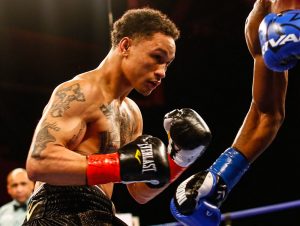
Photo by Stephanie Trapp – Showtime
Fischer: I was talking to (co-manager) Sam (Katkovski) about this while you were training, to my eyes you can have any style. Your style is unique and when I watch you fight it reminds me of old-time fighters, way before Sugar Ray Leonard, I’m talking about Henry Armstrong, Carmen Basilio, guys who had a very physical style but there was a lot of craft and skill to it; a throwback manner of fighting to a time when the style of amateur boxing wasn’t so different from the professional style. In recent decades you can often tell when a fighter has had a really long amateur career because they take that style into the pro ranks, but you seem to have a purely professional style. You go in there and you do what needs to be done. Sam told me that you watch more fighters from previous eras than you do of this era.
Prograis: Yeah, yeah, people ask me if I saw a fight that took place last week and I’m like “nah,” but I’ve got all of Henry Armstrong’s fights that were filmed on tape at home; same with Sugar Ray Robinson, even Joe Gans, what little film there is of him.
Fischer: Really? Is there film on Gans?
Prograis: I think so, maybe not a complete fight but there’s rounds, or pieces of rounds, from different fights. But yeah, but I watch that type of stuff, going back to the black-and-white film of Joe Louis and fighters from his era.
Fischer: And you’ll just pick up whatever moves and techniques you can from watching them?
Prograis: Yeah, but I don’t just watch footage of those fighters, I read about them. All those fighters I named – Joe Louis, Joe Gans, Henry Armstrong – if they got a book, I read about them. If I read an entire book and learn two things about them, or take two things away from it, it’s worth it to me.

Joe Louis hammer Arturo Godoy. Photo from The Ring archive.
Fischer: One thing I’ve noticed from reading those same books and from talking to old trainers and old fighters out here who were around those legendary fighters is that the more you learn about them, the more you see in those grainy old black-and-white film clips. There was an old fighter, a former light heavyweight contender named Paul Andrews, who used to hang out at certain gyms when I first moved to Los Angeles, and I knew he’d been managed and even trained for a time by Joe Louis, so I would talk to him about that. I’d ask him about Louis’ vaunted power and punching technique and he would just say a few words on it, but after hearing those words, immediately, when I’d watch tape on Louis, I’d see things I’d never noticed before. It opened up a whole new dimension on how I perceived Louis. That information gave me insight. I can only imagine the insight you get being a talented, natural fighter.
Prograis: Yeah, and I don’t think a lot of fighters read as much as I do. Actually, I don’t think most athletes read as much about their sport as I do about boxing. Nobody reads like I do. I used to read like six, seven hours a day. Now, I might read an hour a day, maybe two. I’ve got kids and stuff now so it’s hard to read as much as I did. Things change, but even now, I make sure to read every day and at least one hour. I don’t think none of my peers are studying the way that I do. That’s why I think my IQ is higher. It comes from my favorite fighter, Mike Tyson. He was the same way.
Fischer: That’s true. Mike’s a historian.
Prograis: He learned from Cus D’Amato. From what I understand, all he did was watch old boxing films from (co-manager) Bill Cayton’s library, and read about it, and listen to D’Amato’s stories and lessons until he was like an encyclopedia of boxing, and I kind of want to mimic him. I want to know all this stuff, like he knows, even if it’s just certain little things. Like, I read Ray Robinson’s book and I learned that his sister went to school with Joe Louis, and she told him “That boy, all he does is look out the window all day,” you know? Just little things like that. Like I read Henry Armstrong’s book and learned he’s from like, St. Louis, or something like that, and to get fights, he came all the way out to California, jumping trains and hoboing with his manager. So, just to know about these fighters and learn certain things about their lives and know how they trained and stuff, training and sparring with six-ounce gloves on, to know about that stuff, it helps me with my mind and it’s just a one-up on my competition.
Fischer: Yeah, most media don’t know boxing to that degree. They know the legends’ names, but they don’t know what forged those legends.
Do you go over a fight in your mind, do you visualize it, in preparation for it, or do you enter the ring with a clear mind but ready to react to whatever…
Prograis: I’m just go in ready. All this (training) is just to get me mentally and physically ready for anything, so the night of the fight, I just do me. I have fun. It’s fun for me. Going back to my fight with Terry Flanagan, the day of the weigh-in all I could think about was knocking him out early, and then right before the bell rang, I’m like “I’m gonna box.” Because I had never gone 12 rounds before and here was an opportunity to do that. So, I was like “I’m gonna box today.” And it’s not like I didn’t feel like knocking him out, but I wasn’t gonna press, I wanted to show people I could box, and I barely got touched. People were saying I had no defense and I know my defense doesn’t look like I have practical technique where I’ve got my hands up all the time, but for me defense is about how often you get hit, and if you look at the stats from my last two fights (Flanagan and the WBA title-winning stoppage of Kiryl Relikh) I barely got touched, I barely lost a round. So, I wanted to show defense and skill against Flanagan, and against Relikh, it was the same thing. Whatever he gave me, I took advantage of. A lot of fighters try to switch back and forth from orthodox and southpaw, it’s normal these days to change your stance, so if you prepare for a leftie you may wind up with a righty, and vice versa, so I just prepare for everything. Nobody can throw a curve ball at me.
Fischer: In that case, there’s probably no point in my asking you how you think the Taylor fight is going to go.
Prograis: I really feel like I can stop him. He gets hit by a lot of flush punches, not by a lot of punches in general, but by a lot of flush ones. I was at his last fight in Scotland and Baranchyk hit him with a lot of really flush punches. And I told him to his face “You can’t do that with me, you can’t!” Baranchyk is strong, of course, but he’s not a boxer. He can’t box like me, he’s just a brawler that comes in. And Baranchyk was even making him miss sometimes, and I’m like, “if HE makes you miss, you’re not going to be able to lay a glove on me. And if he can hit you, I’m really going to tear you up.”
Fischer: You’re really looking forward to this. Some fighters, including some really prominent Americans, would be leery of traveling to London to fight a U.K. standout, but you’re into it.
Prograis: It’s a dream come true. They might have 20,000 people in the stands. This is what I dream about. This started when I was 16, 17 years old and most fighters, even the best ones who started when they were kids, don’t get a chance to do something this big in 20 or 30 years of being in the sport. So, to get this opportunity in my 25th pro fight, to fight in a unification bout, The Ring belt on the line, the Muhammad Ali trophy on the line, in front of all these people and it’s pay-per-view on Sky Sports, there’s no way I’m passing it up. It’s all excitement for me.
Email Fischer at [email protected]. Follow him on Twitter and IG at @dougiefischer, and watch him on Periscope every Sunday from SMC track.















